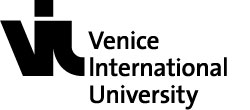
Digital Visualization Training Workshop 2016: the Ghetto of Venice
Mapping and Modeling the Venice Ghetto
June 8-20, 2016
Applications closed on March 31, 2016.
What is it about?
Digital Technologies for Historical and Cultural visualization are transforming the ways that scholars
can study and represent works of art, as well as growth and change in urban spaces and buildings. With the support of The Getty Foundation as part of its Digital Art History initiative, The Wired! Lab at Duke University, Università Iuav di Venezia, the University of Padua, and Venice International University are collaborating on a Summer Workshop that will train Art, Architectural and Urban Historians with the digital media that can enhance or transform their research questions and their capacity to communicate narratives about objects, places and spaces to the public.
Instruction will be in English.
The course will engage with the Ghetto of Venice on the 500th anniversary of its creation as case
study for training with a variety of technologies and applications. (On June 19th there will be the opening of an exhibition dedicated to the history of the Ghetto curated by Prof. Donatella Calabi).
Faculty
Mark Olson and Victoria Szabo, Duke University
Senior Advisors
Caroline Bruzelius, Duke University
Donatella Calabi, Università Iuav di Venezia
Teaching Assistants
Ludovica Galeazzo, Università Iuav di Venezia
Hannah Jacobs, Erica Sherman and Edward Triplett, Duke University
Consultants
Paolo Borin, Università degli Studi di Padova
Gianmario Guidarelli, Università degli Studi di Padova
Course description
The summer course will teach a range of digital skills in mapping, 3D modeling, mobile application
development, and time based media authorship to enable participants to engage historical questions with emerging digital tools. The technologies are taught through the use of a theme, which for the summer of 2016 is “The Ghetto of Venice”.
During the first week of the course participants will learn techniques for digital production by drawing
upon existing research materials. Each day, participants will learn about a different type of digital media production within the context of how that type of reconstruction is typically used in digital art and architectural history.
During the second week, the participants will work collaboratively to create projects using the tools they have learned, with the goal of creating high-quality, public-facing research products suitable for a general audience, as well as identifying potential areas to explore in their own future research.
Learning outcomes
Learning outcomes include: familiarity and facility with digital media production tools for digital art
and architectural history; awareness of the critical and practical challenges to the fields that digital
production techniques pose; understanding of the philosophical and theoretical underpinnings of digital
media authorship as an intervention into digital heritage and lived experience of the city.
Who can apply?
The workshop is designed for Ph.D or Post doctoral participants in the Interpretive Humanities (including Cultural Patrimony, History of Art, Architecture and Urbanism, History, Geography, Architecture, Archaeology, and other relevant disciplines).
Preference will be given to Ph.D. students and recent Ph.D. graduates in History of Art, Architecture and Urbanism.
Instruction will be in English, of which participants must have an adequate working knowledge.
Maximum number of participants: 16
Applications are now closed
Program structure
The course duration is 12 days. Participants should expect to be engaged full time in during the twelve
days. Participants should plan to arrive June 7 and depart June 21.
Credits
An official Duke University/Università Iuav/Venice International University joint Certificate will be issued at the end of the course.
Number of ECTS credits allocated: 3
Duration and Period
12 days, June 8 – 20, 2016
Location
Venice International University on the island of San Servolo in the Venetian Lagoon is an ideal setting
for onsite study. Participants can live in the housing facilities of the island of San Servolo, or arrange for accommodation in the city of Venice.
Tuition and Scholarships
Tuition fees are euro 1,000 (+22%VAT).
Scholarships are available in order to support tuition, travel, board and accommodation expenses.
Thanks to the generosity of the Getty Foundation.
Contacts and info:
Venice International University
Isola di San Servolo
30133 Venice
ITALY
T +39 041 2719511
F +39 041 2719510
E shss@univiu.org, summerschools@univiu.org
Visualizing Venice summer workshop is organized by Venice International University and jointly promoted by:
With the support of:

The Nicholas School of the Environment (Duke University) and Venice International University offer the third edition of a Summer Program that provides training in key topics about the impact of sea level rise on coastal areas and cities, and about adaptation and mitigation strategies.
Environmental Management in a Changing World: Coping with Sea Level Rise
2016 edition - 11-23 July 2016
![]() Detailed Program
Detailed Program
![]() Program Schedule
Program Schedule
The symptoms of Global Warming, and in particular an accelerating sea level rise, are already detectable in several regions of the globe. The discussion, at a governmental level, on the importance of reducing greenhouse gas emissions is ongoing, but strategic decisions have to be taken soon in particular in regard to low-lying coastal areas and cities, considering that coastal areas less than 5 meters above sea level are home to roughly 200 million people worldwide (World Ocean Review 2013). The Venice Lagoon will be used as a “laboratory”, the ideal location to study the intertwined dynamics of human and natural systems under a climate change. The Venice Lagoon is a diverse ecosystem providing invaluable services, which has been deeply transformed over the long history of the Venetian State and, in more recent years, by large scale engineering works. The area is also an exceptionally well-documented case of the coexistence of the natural and the built environments, of the tension between sustainable and unsustainable uses of natural resources, and of the potential for vigorous political controversy over possible adaptation strategies. VIU is uniquely positioned, both geographically and for the suite of multidisciplinary knowledge which it encompasses, to provide an educational program of unmatched quality on these topics.
Target:
Graduate students and working professionals from any university, research institute, or other organization (private companies, government agencies, NGOs) with an interest in environmental issues and ability to read and write fluently in English. Advanced undergraduates will also be considered.
100% of participants rated the program as "highly valuable" in 2015.
What they say about us:
"The classes and professors at VIU were incredible, I met so many wonderful people and learned a lot"
"The ratio of students to professors was ideal"
"The facilities of VIU are great"
"A positive aspect was the opportunity to network"
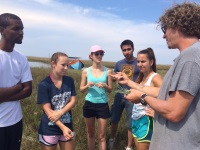 |
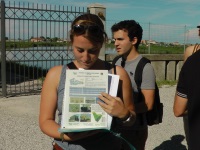 |
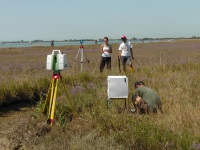 |
Course aim:
What will be the impact of sea level rise on the world's coastal areas and coastal cities? What are the social and economical consequences? What is the forecasted impact on the population health? Should we plan for a "sustainable development" or a "strategic retreat"? And if a strategic retreat is chosen what are the implications for our cultural heritage and legacy? What monitoring and management tools are currently available or should be developed in the near future?
The course aims to give students a broad perspective on the impact of sea level rise upon coastal areas from the social, economical and environmental point of view. Adaptation and mitigation strategies will be analyzed and students will be involved in discussions on critical management issues, developing their own critiquing concepts in a multidisciplinary framework. Participants will learn, in class and in the lab, the use of operational tools for coastal zone monitoring and management, and will participate in four field campaigns aimed at exploring the most up-to-date techniques for coastal defense and protection. The Venice Lagoon will be used as a "laboratory", the ideal setup to study the intertwined dynamics of human and natural systems. The Venice Lagoon is a diverse ecosystem providing invaluable services, which has been deeply transformed over the long history of the Venetian State and, in more recent years, by extremely impacting engineering works. The area also has a rich history with people whose families have resided in the city for generations and have strong attachments to the area. Hence, it is an exceptionally well-documented case of the coexistence of the natural and the built environments, of the tension between sustainable and unsustainable uses of natural resources, and the potential for vigorous political controversy over possible adaptation strategies. The MOSE system, the systems of gates currently being constructed to protect the city of Venice from extreme high tides, is just an example of the important infrastructures that the students will explore.
Lectures will be led by world-class professors and researchers from the Nicholas School of the Environment, (Duke University - US) and Venice International University.
Topics:
• Causes and consequences of global environmental change
• Modelling and prediction of environmental changes in coastal areas
• Social, economic and political impacts of sea level rise
• Environmental monitoring and management of coastal morphology and water quality
• The resilience of coastal human-natural systems
• Analysis of extreme events
• Sustainable development along the coast: strategic retreat or coastal protection/conservation?
• Global health and climate change: future scenarios in coastal areas
Course organization:
The course duration is 2 weeks. Students will attend lectures and labs, 6 days per week and will participate in field trips in the Venice Lagoon and its surrounding.
Credits:
This course has been included in the Master in Environmental Management (MEM) course listing at the Nicholas School of the Environment, Duke University. Students who successfully complete the course will receive 2 MEM Credits from the Nicholas School.
An official Duke University, Nicholas School Diploma will be issued at the end of the course.
Number of ECTS credits allocated: 3.
Duration and period:
2 weeks, 11 - 23 July 2016
Fees:
Students of VIU member-universities: €850 (incl. 22% VAT)
Students of other univeristies: €1250 (incl. 22% VAT)
Professionals: €1800 (incl. 22% VAT)
The tuition and fees cover all teaching materials and field trips. Accommodation and meals are not included.
VIU will provide information and support in sourcing suitable accommodation in the city of Venice.
Location:
Venice International University, Island of San Servolo, Venice (Italy).
List of courses
|
Course title
|
Professor |
|
Global environmental change, global warming, changing oceans and sea level rise |
Georg Umgiesser |
|
Extreme events in coastal areas: data analysis and modelling
|
Marco Marani (Duke University) |
|
The impact of sea level rise and climate change on global water resources
|
Mario Putti (Duke University) |
|
Coastal wetlands ecology, restoration and management
|
Tjeerd Bouma (Royal Netherlands Institute |
|
Coastal environmental change processes: modelling and prediction |
Andrea D'Alpaos (VIU – Padova University) |
|
Environmental monitoring of coastal morphology and water quality (lectures and labs) |
Sonia Silvestri (Duke University) |
|
Planning for Natural Hazards and Climate Change Adaptation in Coastal Areas |
Gavin Smith (UNC Chapel Hill) |
|
Climate change, sea level rise and global health in coastal areas |
William Pan (Duke University) |
Learning outcomes of the program:
Students will explore and become familiar with the following topics:
1) causes and consequences of global environmental change;
2) modelling and prediction of environmental changes in coastal areas;
3) social, economic and political impacts of sea level rise;
4) environmental monitoring and management of coastal morphology and water quality;
5) the resilience of coastal human-natural systems;
6) sustainable development along the coast;
7) global health and climate change: future scenarios in coastal areas.
At the end of the course students will be familiar with the physical processes that generate the global warming phenomenon, and will understand the consequences of changing oceans and rising sea levels. Satellites and other measurement tools will be an integral part of the training, and students will develop an extensive knowledge about models, predictions, and related uncertainties. Students will be required to participate in discussions on the impact of global environmental change on coastal areas, and will understand the importance of new policies for the management of coastal regions and cities and their economic implications.
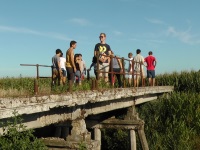 |
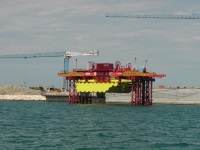 |
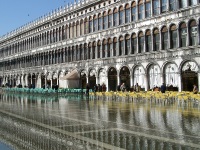 |
June 3 - 28, 2013
Drawing from the Venetian Masters
Alston Conley, Department of Fine Arts
This is an introductory-level studio art course that examines the process, materials, and issues addressed in exploration of the basic principles and concepts of making visual artwork through drawing. The goal of this class is to connect to that tradition by synthesizing visual language, images that one would want to contemplate and retain. The first few days will be spent learning drawing skills through daily class assignments. After a few introductory drawing classes at the school, most of the classes will be spent visiting museums and churches to view and draw from the great works. The class will make multiple visits to the Gallerie Dell’ Accademia. The development of Venetian art is represented in the Accademia collection. You will draw workings by Giovanni Bellini, Vittore Carpaccio, Titian Vecello, Jacopo Tintoretto, Paolo Veronese and others. The class will also visit the paintings housed in their original sites at: The Basilica of Santa Maria Gloriosa Die Frari, The Basilica of Santa Maria Della Salute, Church of the Gesuiti, The Scoula Grande di San Rocco, and the Church of San Giorgio Maggiore, and other sites.
The readings from Painting in Renaissance Venice, by Peter Humfrey, will introduce students to the history of Venetian Renaissance Painting. The class will challenge the students to absorb and understand the visual culture of Venice, its traditions and achievements.
Thank you for your application.
Successful candidates for the Digital Visualization workshop and recipients of grants will be notified by e-mail by April 15.
For surther information please write to: summerschools@univiu.org
Thank you for your application.
After the registration closure you will receive a confirmation by the Selection Committee.
For further information please write to: summerschools@univiu.org
